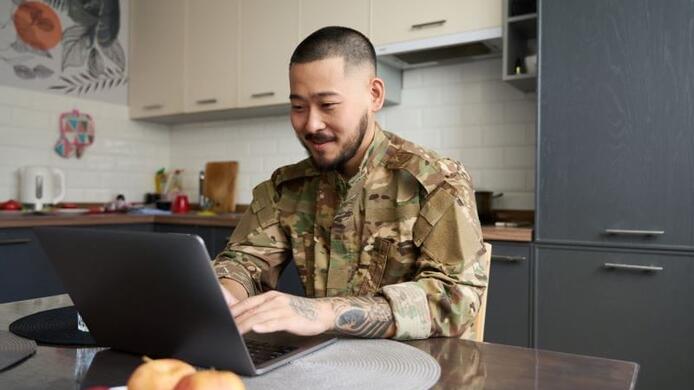UMass Global offers a wide variety of degree programs for active military and veterans. Explore your options and find a degree that fits you.

Making the decision to return to school as a veteran student can present a distinct combination of both challenges and opportunities. This could be the case whether you're in the process of transitioning from military service or if you're simply making a comeback after a well-deserved break. Regardless of the circumstances, it's important to approach and navigate your academic career with confidence, ensuring you are fully prepared to tackle whatever comes your way.
Challenges Faced by Veteran Students
Transitioning from military life to student life can present a range of challenges for veteran students. Some of the common challenges include:
- Academic Environment: One of the main obstacles for veteran students is adjusting to the academic environment after years of military service. The structured and disciplined nature of military life can be vastly different from the independence and autonomy common in higher education.
- Peer Relationships: Veterans may experience difficulties relating to their classmates. The varying life experiences can create a sense of isolation or disconnection. Additionally, veterans may struggle with the transition from a highly regulated and hierarchical environment to a more peer-oriented setting where everyone is considered equal and relationships revolve around friendship, shared educational pursuits, and mutual respect.
- Mental Health Difficulties:Veteran students may also be coping with mental health issues such as post-traumatic stress disorder (PTSD) or anxiety. Veterans may come into contact with triggering subject matter, leading to concentration difficulties and a decline in academic performance.
What to Look For in Veteran-Friendly Colleges
Choosing the right college or university is crucial for veteran students to have a successful academic experience. Here are some tips to consider when applying to college as a veteran:
- Veteran-friendly policies: Look for institutions that have a track record of supporting veteran students. Consider factors such as dedicated veteran resource centers, flexible course options, and a strong sense of community.
- Variety of academic programs: Ensure that the college or university offers programs that align with your career goals and interests. Look for programs that have a good reputation and provide ample opportunities for experiential learning and networking.
- Positive veteran experiences: Reach out to current or former veteran students at the schools you are considering. They can provide valuable insights into their experiences and help you make an informed decision.
- Accepts grants and VA benefits: It's important to choose a school that recognizes and accepts VA benefits and grants. This not only eases the financial burden but also signifies the institution's commitment to supporting veteran students.
Remember, choosing the right college or university is a personal decision, and what works for one veteran student may not work for another. Take the time to research universities to ensure that you find the best fit for your needs.
5 Tips for Transitioning to Civilian Life as a Veteran Student
Transitioning from military to civilian life as a student can be a significant adjustment for veteran students. Here are some strategies to help ease the transition and make the most of your educational journey:
Take Advantage of Financial Aid
There are a variety of financial resources veterans can take advantage of such as the Post 9/11 GI Bill, which can cover tuition, housing, and other educational expenses. To receive this form of financial aid, you will need to have served on active duty for at least 90 days, consecutively or intermittently. At UMass Global, we also accept Montgomery GI Bill® Active Duty (MGIB-AD) - Chapter 30 and Veteran Readiness and Employment (VR&E) - Chapter 31. We also participate in the Yellow Ribbon Program.
In addition to federal financial aid programs, such as grants and loans, many colleges and universities also provide veteran-specific scholarships and grants to further support veterans in their educational pursuits. On top of offering scholarships and grants for veterans, UMass Global offers a 50% off tuition discount for course-based undergraduate programs.
Although not technically "financial aid," UMass Global also provides credit to military members for training and certain leadership roles. This can dramatically decrease the length of time necessary to earn a degree, along with, of course, the cost. Depending on your background, you may be able to earn up to 15 credits for your military training and leadership experience.
By taking advantage of these resources, you can effectively reduce the financial burden associated with pursuing higher education, allowing you to fully concentrate on accomplishing your academic and professional objectives.
Cultivate Effective Time Management Strategies
Navigating the balance between academics and personal commitments can often present a challenge. However, the development of effective time management strategies can significantly reduce the stress of managing a large course load and difficult classes.
The first step towards achieving this balance is to create a realistic study schedule. This schedule should not only account for the time needed to complete academic tasks but also include regular breaks. These breaks are essential to avoid a decline in the effectiveness of study sessions. Breaks are also essential for practicing self-care, which can help ensure healthy mental well-being.
Once you have a schedule in place, prioritize coursework based on its level of importance and deadlines. This allows you to focus your efforts where they are most needed. In addition to prioritizing tasks, it can also be beneficial to break down larger, more daunting tasks into smaller, more manageable parts. This approach can make the task seem less overwhelming and more achievable, reducing the tendency to procrastinate.
Build a Support System
Building a support network on campus is crucial for veteran students to navigate the challenges and opportunities of college life successfully. While family and friends can be a great source of support as you embark on your educational journey, a support system can also be built while enrolled in your degree program.
Actively engage with your professors and classmates by participating in class discussions, attending office hours, and seeking out opportunities for collaboration. Building relationships with faculty and peers can provide academic and personal support. Veteran faculty members can also act as mentors, helping guide you through your time in school and in your career.
Engaging with peers outside of the classroom is important for developing a support network as well. Explore student organizations or clubs that align with your interests or goals. Participating in extracurricular activities will allow you to meet like-minded individuals and expand your network. Additionally, take advantage of events and workshops that cater to veteran students or cover topics of interest. These events provide opportunities to connect with others and gain valuable knowledge and skills.
Utilize University Resources
As a veteran returning to school, it is crucial to make the most of the resources available at the university. These resources can provide valuable support and assistance in navigating the academic landscape and achieving success.
Many veteran-friendly colleges have resource centers designed to support veteran students through a variety of services including academic advising, career development, and tutoring. At UMass Global, our Office of Accessible Educationhelps veteran students develop soft skills such as self-advocacy, responsibility, and more. Additionally, our Career Services team helps veteran students translate their skills from active duty into a civilian resume and help secure employment to kickstart a successful career.
Embrace Your Life in the Military
Veterans bring a unique and invaluable set of skills and experiences from active-duty service to the academic journey. Discipline, resilience, and adaptability cultivated through high-pressure situations can be powerful assets in education. With diverse backgrounds, veterans often provide a different perspective in classroom discussions, enriching the learning experience for everyone in the course.
The ability to collaborate seamlessly, a hallmark of military training, becomes a valuable asset in group projects and team-based assignments, allowing veterans to contribute meaningfully while fostering a culture of teamwork.
As mentioned above, at UMass Global we also offer up to 15 course credits for those who have served in leadership positions in the military including Commissioned Officers, Warrant Officers (CWO2+), and Senior NCO's (E7+). This allows veterans with these credentials to earn a Master’s of Business Administration or Master’s in Organizational Leadership in only 7 classes.
Unlock Your Academic Potential with UMass Global
Going back to school as a veteran student can be both challenging and rewarding. By understanding the unique challenges you may face, connecting with available resources, and implementing effective strategies, you can make the most of your educational journey. Remember to prioritize self-care, seek support when needed, and embrace the opportunities for growth and learning. Your experiences as a veteran bring valuable perspectives to the academic environment, and your determination and resilience will undoubtedly contribute to your success.
As you embark on this new chapter in your life, know that there is a community of individuals who understand and support you. At UMass Global we are committed to helping those who have supported our country. With over 13% of students having military ties and a large faculty and alumni network who have served, we ensure our veterans are well supported throughout their educational journey.
Request more information about our online bachelor’s and master’s degree programs or apply today.





